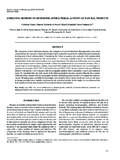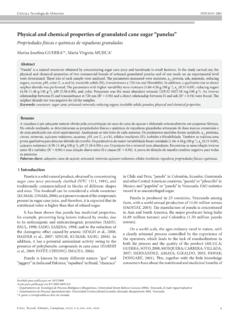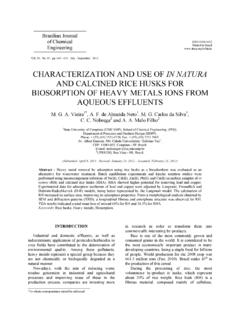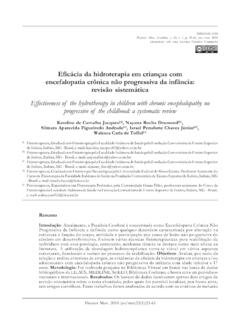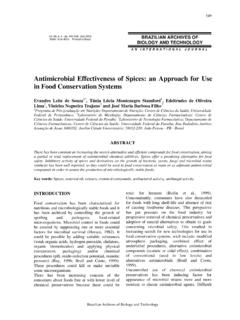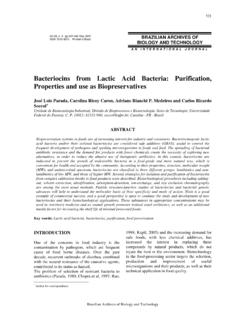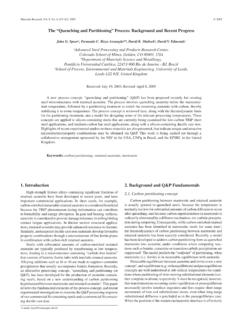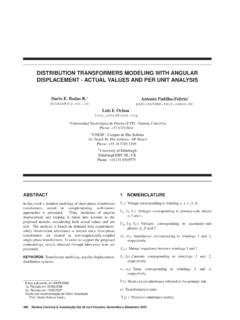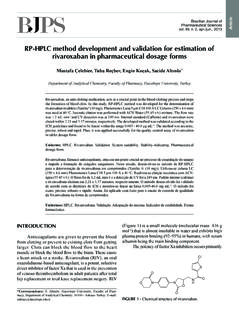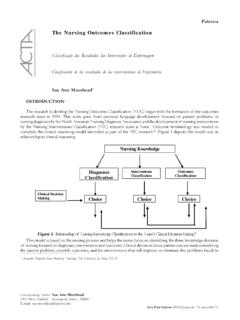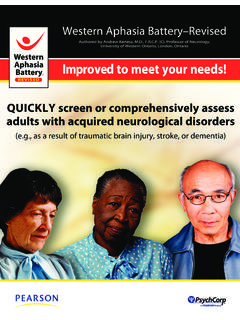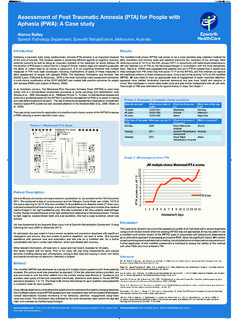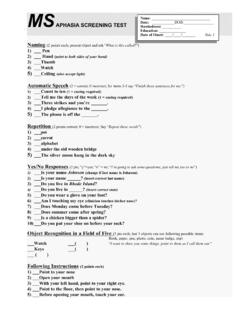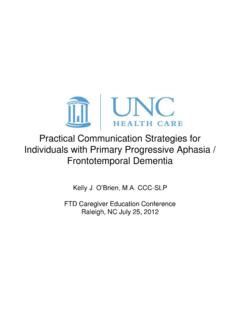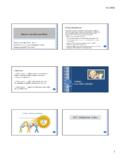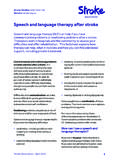Transcription of Cognitive deficits in post-stroke aphasia - SciELO
1 840 DoI: deficits in post - stroke aphasiaD ficits cognitivos na afasia p s-AVEM ilena V. Bonini1, 2, M rcia Radanovic1 Approximately one third of patients who survive the first weeks after stroke are aphasic. aphasia due to stroke is as-sociated with increased mortality, worse functional recovery, and lower chances of returning to work processing depends on other Cognitive func-tions such as attention, memory, executive functions and visuospatial abilities, which act as supportive systems.
2 On the other hand, much of human`s thinking pattern rely on language itself, which renders it to be a critical function in reasoning, abstract thinking, and problem solving. It is well established that language and other Cognitive functions are interrelated, and researchers efforts are currently focused on searching for evidence on how and to what degree the differ-ent Cognitive domains are recruited to interact with each oth-er, as well as on the impact of a particular Cognitive function impairment in other functions2.
3 One factor that permeates this interrelation between Cognitive functions is the overlap of anatomical sites affected in vascular lesions, because the same brain region can be simultaneously required to partici-pate in different Cognitive neuropsychological tests used to assess aphasics performance in non-linguistic tasks depend on verbal expres-sion, and therefore, have proven to be unsuitable, especially in severe recent years, the concept of vascular Cognitive impair-ment has gained much attention in the literature, as it pro-poses a new framework for establishing the relationship be-tween cerebrovascular disease and Cognitive decline, which encompasses a spectrum varying from various forms of vascular mild Cognitive impairment (VaMCI) to vascular de-mentia (VD).
4 aphasia may hamper an accurate appraisal of general Cognitive abilities due to the difficulties in performing 1 Universidade de S o Paulo, Faculdade de Medicina, Departamento de Neurologia, Sao Paulo SP, Brazil;2 Universidade de S o Paulo, Hospital Universit rio, Sao Paulo SP, : Marcia Radanovic; Rua Cristiano Viana, 163/ap. 92; 05411-000 S o Paulo SP, Brasil; E-mail: of interest: There is no conflict of interest to 04 February 2015; Received in final form 20 May 2015; Accepted 08 June assessment of aphasics Cognitive performance is challenging and such patients are generally excluded from studies that describe Cognitive deficits after stroke .
5 We evaluated aphasics performance in Cognitive tasks compared to non-aphasic subjects. A sample of 47 patients (21 aphasics, 17 non-aphasics with left hemisphere lesions and 9 non-aphasics with right hemisphere lesions) performed Cognitive tasks (attention, verbal and visual memory, executive functions, visuospatial skills and praxis). Aphasic patients performed poorer than all non-aphasics in Digit Span (p < ), Clock-Drawing Test (p = ), Verbal memory (p = ), Visual Memory (p < ), Verbal Fluency (p < ), and Gesture Praxis (p < ).
6 aphasia severity correlated with performance in Trail Making test part B (p = ), Digit Span forward (p < ) and backwards (p = ), and Gesture Praxis (p = ). aphasia is accompanied by deficits not always easy to be evaluated by Cognitive tests due to speech production and motor impairments. Assessment of Cognitive functions in aphasics might contribute to optimize therapeutic : aphasia , stroke , memory, executive function, attention, avalia o cognitiva de af sicos dif cil e tais pacientes s o frequentemente exclu dos dos estudos que descrevem d ficits cognitivos p s-AVC.
7 Avaliamos o desempenho de af sicos em tarefas cognitivas comparados a n o-af sicos. Um grupo de 47 indiv duos (21 af sicos, 17 n o-af sicos com les o E e 9 n o-af sicos com les o D) realizou testes cognitivos (aten o, mem ria verbal e visual, fun es executivas, habilidades visoespaciais e praxias). Af sicos apresentaram pior desempenho do que n o-af sicos em Extens o de D gitos (p < 0,001), Desenho do Rel gio (p = 0,006), Mem ria Verbal (p = 0,002), Mem ria Visual (p < 0,01), Flu ncia Verbal (p < 0,001) e Praxias Gestuais (p < 0,001).
8 A gravidade da afasia correlacionou-se com o desempenho no Teste de Trilhas parte B (p = 0,004), Extens o de D gitos direta (p < 0,001) e inversa (p = 0,01), e Praxias Gestuais (p = 0,002). Afasia acompanhada por d ficits dif ceis de ser avaliados devido s defici ncias de express o e motoras. A avalia o das fun es cognitivas em af sicos pode otimizar a interven o terap : afasia, acidente vascular cerebral, mem ria, fun o executiva, aten o, cogni V. Bonini et al. Cognitive deficits in Aphasiaa reliable neuropsychological evaluation in this population.
9 This, in turn, may lead to misclassification of patients as pos-sible VaMCI / VD instead of probable VaMCI / VD if there is not documented evidence of normal Cognitive function prior to the onset of aphasia5. In fact, there is a tendency toward excluding aphasic patients in studies addressing Cognitive outcome in stroke heterogeneity of response in patients with the same degree of aphasia under similar therapeutic interventions has raised the question about the role of other Cognitive func-tions in this variability.
10 Nicholas7 have found poorer perfor-mance when training alternative communication in aphasics who presented executive dysfunction, and Fillingham et reported that episodic and working memory, as well as rea-soning impairments affected aphasics performance during anomia therapy. These studies point to the importance of the assessment of Cognitive functions in aphasic patients in or-der to optimize the therapeutic the notion that aphasia constitutes a major obstacle to an adequate neuropsychological evaluation is considered common sense , very few studies addressed this issue objectively in order to investigate which abilities are more compromised and to quantify this impairment.
